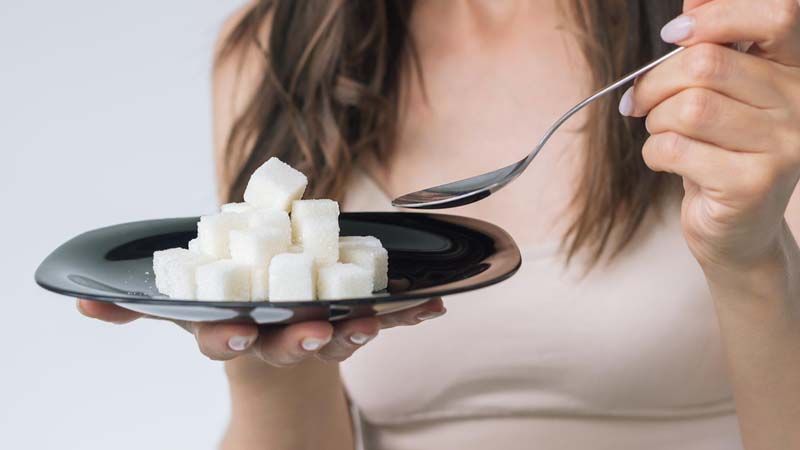Sweet Truth: Why Your Body Crave Sweets?
- 16 months ago
You're at your desk, deep in work when an intense sweet craving strikes. You try to resist, but it's irresistible. You're pulled into the kitchen, craving that instant sweetness fix. Ever wondered why we crave sweets so much, even when we know they're not the healthiest option?
A desire for sugar might indicate a deficiency in essential nutrients or vitamins, or it could suggest imbalanced blood sugar levels.
The attraction to sweets is something we all share, no matter where we come from. Whether it's the rich delight of a chocolate truffle, the cozy feeling of warm apple pie, or the simple joy of ice cream on a hot day, sweets have a way of making us feel happy.
But have you ever thought about why we, as humans, love sweet things so much? Is it just because we like the taste, or could there be a more interesting reason hiding behind our love for sweetness?
Reasons of sugar cravings
The serotonin theory
One of the leading theories behind sugar cravings is the connection between sugar consumption and serotonin, referred to as the "feel-good" hormone. When you eat sugary foods, your brain releases serotonin, which can momentarily boost your mood and make you feel happier. It is why people often turn to sweets when they're feeling down or stressed.
Blood sugar levels
Our bodies need a stable blood sugar level to function properly. When blood sugar levels drop too low (hypoglycemia), it can trigger cravings for quick sources of energy, like sugar. Consuming sugar causes a rapid spike in blood sugar, providing a short-lived energy boost. However, this is followed by a crash, leading to further cravings.
Also read: Foods that spike your blood sugar level
Habitual consumption
Over time, consuming sugar can lead to a habituation effect. Your body becomes accustomed to the presence of sugar, and you may need to eat more to experience the same pleasurable sensations. It can perpetuate sugar cravings and contribute to overconsumption.
Also read: Do you know about different types of sugar?
The side effects of sugar cravings
While indulging in sweets occasionally is not inherently problematic, excessive sugar consumption can have adverse effects on your health. Over time, it can lead to:
- Weight gain: Sugary foods are often calorie-dense and can contribute to weight gain when consumed in excess.
- Increased risk of chronic diseases: Excessive sugar intake is linked to the development of conditions such as type 2 diabetes, heart disease, and obesity.
- Dental issues: Sugary foods and drinks can contribute to tooth decay and cavities.
- Energy fluctuations: The sugar rollercoaster can leave you feeling tired and sluggish after the initial energy boost wears off.
Are sugar cravings genetic?
Yes, genetics can play a role in sugar cravings. Some individuals may be genetically predisposed to having a stronger affinity for sweet tastes. Genetic factors can influence your taste preferences, making you more or less sensitive to the sweetness of foods. However, genetics is only one piece of the puzzle.
Environmental and lifestyle factors also play significant roles in the development and persistence of sugar cravings. Factors such as childhood exposure to sugary foods, stress levels, and learned behaviors can contribute to the strength of your cravings. While genetics may lay the foundation, your choices and environment can significantly impact whether those genetic predispositions manifest as strong sugar cravings.
Also check: Does eating too much sugar cause diabetes?
Can you rewire your cravings?
The good news is that you can regain control over your sugar cravings and reduce your dependence on sugar. Here are some detailed strategies to help you break free from the sugar cycle:
- Gradual reduction: Quitting sugar cold turkey can lead to withdrawal symptoms and increased cravings. Instead, adopt a gradual reduction approach. Start by cutting back on the most sugary items and gradually reduce your overall sugar intake over time. This approach allows your taste buds and brain to adjust more comfortably.
- Balanced diet: Prioritize a balanced diet that includes whole grains, lean proteins, fruits, vegetables, and healthy fats. This balanced approach helps stabilize blood sugar levels, reducing the likelihood of sugar cravings.
- Mindful eating: Take note of your body's hunger and fullness indications. Eating mindfully can help you make healthier food choices and prevent overindulgence in sugar-laden snacks.
- Healthy substitutes: Replace sugary snacks with healthier alternatives. For instance, choose fresh fruit, unsweetened yogurt, dried fruits or nuts when you are craving something sweet. Over time, your taste buds will adapt to appreciate these natural sweetness sources.
- Stress management: Find effective ways to manage stress, as it can trigger emotional eating and sugar cravings. Engage in activities such as exercise, meditation, deep breathing, or spending time in nature to help reduce stress levels.
Also check: Break sugar addiction
Conclusion
Sugar cravings are a complex phenomenon rooted in biology, psychology, genetics, and lifestyle choices. Understanding the multifaceted causes of sugar cravings can empower you to make informed decisions about your dietary habits and overall well-being. While the serotonin theory explains our attraction to sugar's mood-enhancing effects, the rollercoaster of blood sugar levels and habitual consumption contribute to cravings that can be challenging to overcome.









